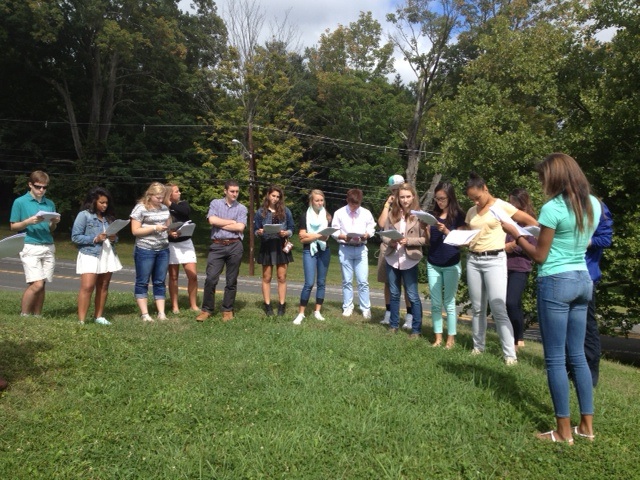 On Saturday, September 14, a group of students from Michael Fay’s AP U.S. History class climbed a hill to a large stone marker. Located near busy Route 66 and Smith College, the site commemorates the place where two Irish immigrants were executed in 1809.
On Saturday, September 14, a group of students from Michael Fay’s AP U.S. History class climbed a hill to a large stone marker. Located near busy Route 66 and Smith College, the site commemorates the place where two Irish immigrants were executed in 1809.
Largely viewed to be victims of ethnic and religious bigotry, the two men, Dominic Daley and James Halligan, had been persecuted for murder. They were exonerated in 1984. Their case was novelized by author Michael C. White in the book The Garden of Martyrs, which Mr. Fay assigned to his students as summer reading. As part of their trip, the group climbed the hill where the executions took place and read aloud Mr. Daley and Mr. Halligan’s last words.
Upon their return to campus, Mr. Fay asked the students to write comments about the trip. “How did it make you feel to stand near the spot where James Halligan and Dominic Daley could see both the procession of spectators behind them, and the gallows in front of them?” he asked.
The students responded with a range of perspectives: from the empathetic (“They were people, just like me or anyone I know,” wrote Emma Kaisla) to the metaphysical (“It forced me rethink the importance of the human life and death,” noted Marcus Gould). Gabriel Jacobson said he better understood that “past wrongs over time become lessons,” while Alec Bickerstaff compared the hanging to a modern rape trial and wrote, “Can we honestly say that as a country we are any different/ less discriminatory/ less racist?”
Others, such as Hannah King, said being on the site of the hanging helped them more fully understand the emotional and historical impact of the execution.
“I found myself feeling guilty, as if I was the one who sentenced them there; as if I was the one who put those bags over their heads; as if I was the one pressured to lie at the witness stand,” Ms. King wrote. “I wanted to help these two men, but it is too late.”
Mr. Fay said later that he was amazed by the depth and thoughtfulness of the students. After reading all of the submissions, he wrote a note thanking the students.
“The compassion in your words of wisdom is reassuring that your generation has the capacity to make the world a better place,” he wrote.




 The 21 students of the AP environmental science class trooped into the room at the Mt. Tom Power Plant. The trip had been billed as a tour of the facilities, but the students weren’t exactly sure what to expect.
The 21 students of the AP environmental science class trooped into the room at the Mt. Tom Power Plant. The trip had been billed as a tour of the facilities, but the students weren’t exactly sure what to expect.